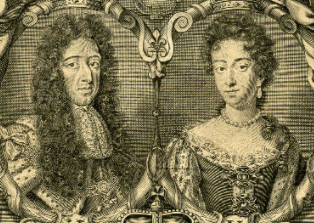Follow us on Facebook @FHofDW
Deal’s Early Freshwater Schemes
The Glorious Revolution
Whoever William Ryder and Edward Burdett were, neither man did anything to use their Patent to bring fresh water to the ‘New Town of Deal’ for the next 12 years.
This is possibly due, in part, to the ’Glorious Revolution’. James II was a catholic and there were fears with the birth of his son, Prince James Francis Edward Stuart, that there would be a new catholic dynasty. This at a time when there were deep seated fears of ‘popery’ led the Whigs to invite William of Orange and his wife Mary, who was James’ daughter, to take the throne. So in November 1688 William of Orange landed at Torbay and marched on London, then in February they were declared King and Queen and crowned on April 11th.
This ’Revolution’ may well have brought financial and or religious difficulties for one or both of these men to the detriment of the freshwater scheme.
The Second Water Scheme
Then in 1698 or early 1699 another man, William Warner, presented plans to the inhabitants of Deal and also to the Archbishop of Canterbury, whose See owned much of the land in and around the town at the time. By the middle of 1699, he had at least made a start by digging test wells and ‘selling’ his scheme to those who could afford to buy into it. To bring his plans to fruition though, he needed to dig trenches across people’s land in which to lay down pipes and also, to do the same within the streets and roads of the town. For this he needed an Act of Parliament. In January 1699 Warner petitioned the House of Commons to bring in a Bill, which if passed would gain him an Act of Parliament giving him the authority to proceed with his plans.
He had by this time already gained a grant from Archbishop Thomas Tenison, taken out a ninety-nine year lease from Deal’s Corporation at a yearly rent of £22, and had already invested £1,600 upon the work, which he states was nearly finished.
His petition says that he had found a “…method…” of providing Deal with freshwater and that “… the Town of Deal hath always been in want of wholesome Water…”. Thus indicating that Burdett and Ryder’s scheme had gone no further.
Indeed the Mayor and Jurats of Deal confirm this when, in May 1701, they petition the House of Commons in favour of William Warner, saying that “..for 12 years after Mr Rider nor any concerned in the Patent hath conferred with the inhabitants nor given a satisfaction or reason of the cause of the long delay…”
The Petition was read on 23 January 1699/1700 it was then ‘Ordered’ that a Mr. Brewer was to prepare and bring in the Bill which was duly done and ‘Read’ for the first time on 1 February when a second reading was agreed to be made two weeks later on the 14th.
Ryder’s Response
Ryder, seemingly now being in a position to commence with his own scheme, and hearing of Warner’s petition and or the work at Deal, decided to take action. So on 6 February, he presented his own petition to the House of Commons reminding them that ‘Letters Patent’ had already been granted to himself and Edward Burdett and that they too had laid out a great deal of money for engineers to “…go from London to Deal…and to treat with the inhabitants, in order to the speedy completing of the said works…”
He was obviously not happy about Warner’s claims and went on to say that “…William Warner is endeavouring to advantage himself by the Petitioners (Ryder’s) discovery…”
It was ordered that Ryder’s petition was to “…lie on the table…” until Warner’s Bill had had its second reading. Unfortunately for Warner his Bill failed to gain approval, passing as they say “…in the Negative…”.
With Warner seemingly out of the way Ryder must have been hopefully optimistic when, two days later, his Petition was read and Robert Davers was then ordered to prepare and bring in his Bill. After passing it’s second reading the Bill went on to the committee stage on 29 February.

